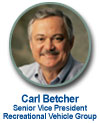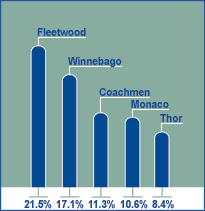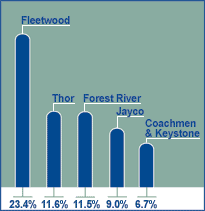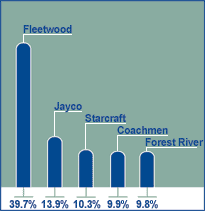

|
Recreational |
 |
|
| RV Industry Served as Leading Indicator of the Changing Economy | ||
 |
Industry shipments in calendar 2000 slipped for the first time in five years, down 7 percent to 300,100 units. Although this was still the second best shipment figure in the past 22 years, the real story was the precipitous 21 percent slide in the fourth quarter, a weakness that has persisted into calendar 2001. The decline has stemmed primarily from a drop in consumer confidence, a stock market correction, a slowing economy and rising gasoline prices. Industry and economic experts agree that the long-term outlook for the RV industry remains positive as Baby Boomers move into the traditional RV-buying age range. In fact, this consumer population helped drive the record sales volume that we achieved in fiscal 2000. We remain confident that these “Boomers” will return to the market when the economy stabilizes. And we believe that our new product lineup will draw them to Fleetwood. |
|
| Fleetwood Took Action to Face Market Environment | |
|
Fleetwood’s recreational vehicle sales dropped in fiscal 2001 to $1.2 billion from $1.9 billion last year. There is strong evidence that consumer demand for motor homes trailed off sharply following the stock market correction in April 2000, which is when the retail selling season for RVs traditionally begins. As a result, motor home dealers and our manufacturing plants began the fiscal year with high inventories of finished products. And as production slowed sharply, motor home chassis — expensive, long lead-time components — began to accumulate at our plants. The demand for towable RV products remained relatively healthy until later in calendar 2000, when it also began to soften. We focused throughout the year on reducing both dealer and plant inventories, and began fiscal year 2002 with 37 percent less retail inventory at our retailers, significantly lower chassis inventory and virtually no finished goods inventory at our plants. This was accomplished at a high cost, however, because of retailer and retail sales incentives used to move existing product through the distribution system. We also closed two motor home plants and one travel trailer plant, transferred production from another travel trailer plant where labor costs were particularly high to a previously idled plant, and opened a plant to produce our new entry-level travel trailers. In addition, we cut back hours at our other plants in order to slow production to market levels. As a consequence of these moves, our operating results in fiscal 2001 suffered. Gross profit fell to $147.8 million, or 12.3 percent of sales, from $329.7 million or 17.2 percent last year. After selling and general and administrative expenses, we lost $73.1 million from operations, compared with operating income of $104.1 million in the prior year. The impact of most of the cost-saving measures that we implemented during the year was offset by the short-term cost of making the cuts. But we have taken more than $30 million from our overhead structure, which will benefit us in fiscal 2002 and beyond. Payroll reductions and plant closings made up the bulk of the savings, but we also made significant cuts in marketing and service costs. We believe that the way we restructured these two areas will actually result in improved, more targeted marketing efforts and greater service satisfaction. |
Market Share Leaders
motor homes 2000  Market Share Leaders travel trailers 2000  Source: Statistical Surveys, Inc. Year-End 2000 Statistics |
| Industry
Leadership Maintained; Aggressive Changes Addressed Market-Share Slips |
|
|
We remain the largest manufacturer of recreational vehicles in the nation, a position we have held for more than 25 years. In fact, we sell more than twice as many RVs as our nearest competitor, and fully one-quarter of all RVs on the road are Fleetwoods. Nonetheless, our market share has been slipping, particularly in Class A motor homes and travel trailers. We are convinced that this is a direct result of allowing our emphasis on product innovation and efficient product development to slip over the past few years. We have taken forceful steps to regain our competitive edge in this area. First, our senior RV management team was completely revamped. Under the leadership of Carl Betcher, who was appointed senior vice president of the RV Group midway through the fiscal year, we have reorganized a number of our separate key division functions under a single RV Group umbrella structure. We have also incorporated some important best practices from world-class companies into our RV product development process. Sales, marketing and product planning for both motor homes and travel trailers are now the responsibility of one vice president, John Draheim. Similarly, our vice president of product development, Dennis Ogawa, has responsibility for both products. Formerly, motor homes and travel trailers had different staffs for product planning and development. Both John and Dennis have international experience in other industries and bring new ideas and disciplines to our processes. As a result of these changes, Bill Bockoven and John Green, our new vice presidents of operations for travel trailers and motor homes, respectively, are focused on product quality, factory operations and division operating results, without the added responsibilities of sales, product planning and product development. We are confident that our new product development process — involving cross-functional core teams composed of associates from marketing, sales, service, engineering, design, product development, manufacturing, supplier management and finance — is incorporating exciting ideas into our new products. The product development process is disciplined and efficient, yet even more creative. It has already reduced concept cycle times from days to hours. Most importantly, time to market has improved dramatically with significantly reduced overhead costs. Read more about this process. |
|
| Steps Taken to Create Long-Term Customer Loyalty | |
|
Another significant change that we initiated this past fiscal year was the strategic release of new products. We have already started to introduce refreshed lines and product innovations prior to peak retail seasons. We have also renewed our emphasis on brand identity. We are focused on our customers’ feelings and viewpoints about our products as we develop new brands and as we concentrate on leveraging the equity of our core brands. In addition, we have refreshed and re-energized our product planning process, recognizing the importance of market research and analysis to a successful product launch. One of the most important initiatives of the past year was the implementation of Customer Relationship Management (CRM). Our customer service representatives have been trained in this advanced information technology and we have deployed it at our national centralized customer service call center. Read more about this initiative. Fleetwood introduced new entry-level products in the motor home and travel trailer categories during the last year. We had not been adequately represented in this important category previously. Statistics show that the majority of people who try the RV lifestyle stay with it for life. Our strategy is to capture these consumers at the outset and retain them as Fleetwood RV customers for a lifetime. |
| “We're driving the industry.” | |
|
|
Dave Russell created a chart that shows Fleetwood’s market share rising for more than two decades, while we dominated new idea introductions. Then through the 90s, while others provided much of the innovation, it shows our market share falling. “Our job is to find out what customers and dealers want today and in the future, and deliver it,” says Dave, a Fleetwood associate since 1972. To revitalize innovation, consultants helped Fleetwood’s RV Group management institute a new product development process (PDP) in 2000, forming cross-functional teams of associates who impact the product from start to finish. Dennis Ogawa, the project’s lead consultant, joined Fleetwood last year. One example of how product planning and PDP are now more tightly integrated:
Dave let Dennis’ group know that the active lifestyle of today’s
RV owners was increasing the need for storage space for sporting and
similar equipment. While Fleetwood’s models have traditionally
offered abundant storage, they have (as have all U.S.-manufactured RVs)
provided access from only one side of the vehicle. And so today, Fleetwood
is about to bring to market the nation’s first RV with storage
space accessibility from three sides of the vehicle. Dennis notes that Fleetwood’s new approach to product development has led to a 50 percent reduction in time to market with fresh, innovative products. “We’re doing 2.4 times the work with half the staff,” Dennis says. “And our goal is to leapfrog the competition by proactively addressing customer needs.” (return to shareholder
message section) |
| Folding Trailer Market-Share Leadership Increased | |
|
The folding trailers manufactured by Fleetwood and marketed under the Coleman® brand have set the standard for the industry. Unit sales for the industry dropped in this category by 11.8 percent, but Coleman trailers fell by only 1.9 percent, ending calendar year 2000 with a 39.7 percent market share. Young families are the most likely buyers of folding trailers, as they look for affordable ways to take vacations together and enjoy the great outdoor camping experience. Over the years, the Coleman brand has earned the distinction of being the most trusted name in outdoor recreation. The folding trailer division’s market-share leadership is evidence that we are sustaining the tradition of Coleman excellence. Our folding trailer operation focuses on high quality and innovation. The Coleman Caravan, “The Expandable Travel Trailer,” was introduced during fiscal 2001. This concept in trailers originated directly from suggestions of long-time customers, and is designed to enhance the outdoor experience while providing luxurious comfort. |
Market Share Leaders
folding trailers 2000  Source: Statistical Surveys, Inc. Year-End 2000 Statistics |
| Demographic Trends Indicate Positive Long-Term Outlook | |
| Despite the temporary drop in retail demand for RVs, we feel confident that the market will once again rebound when consumer confidence strengthens, fuel prices decrease or stabilize, and the economy resumes its growth. An RV is a discretionary purchase and economic forces can easily cause short-term hesitations in buying behavior. However, those who watch the industry closely rely on census projections of a large population in, or approaching, prime RV buying age, supported by lifestyle and vacation preferences that encourage RV use. | |
| <<Previous (Message to Our Shareholders) |
Return to Top | Next>> (Housing) |